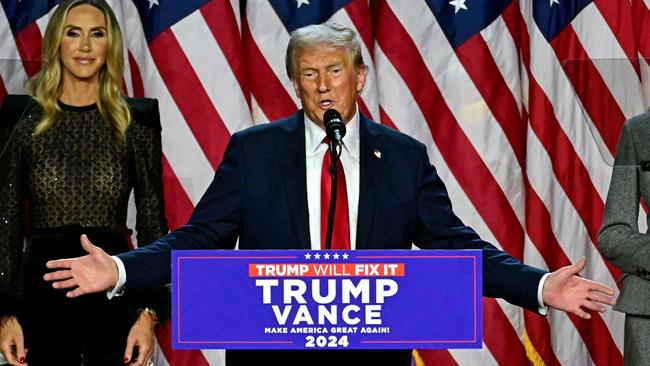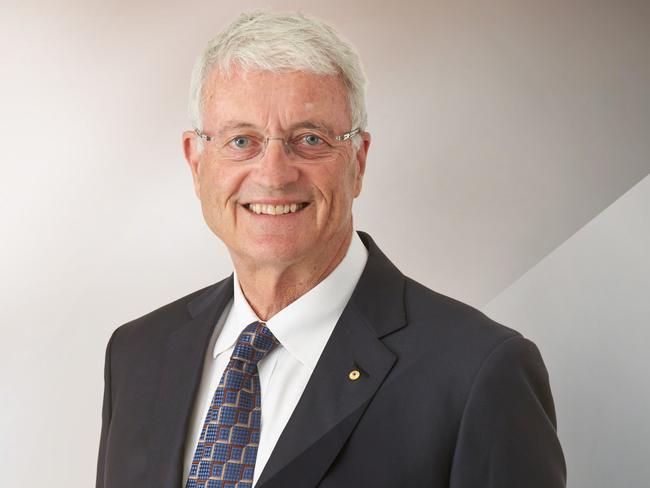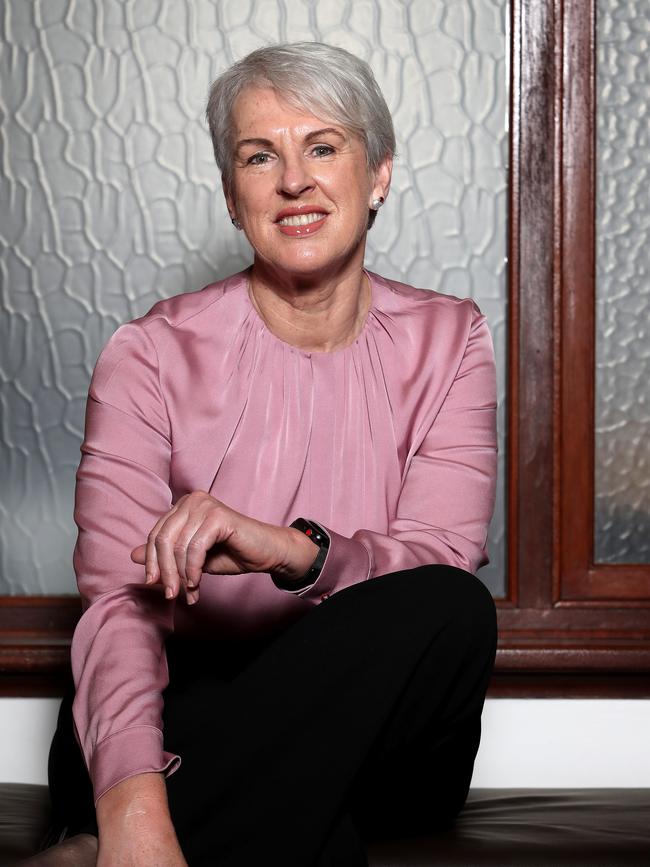Business leaders raise alarm that Trump trade wars could revive inflation
Prominent Australian business leaders have warned that Donald Trump’s second US presidency risks sparking a fierce trade war with China, stoking inflationary pressures around the world.

Prominent Australian business leaders have warned that Donald Trump’s second US presidency risks sparking a fierce trade war with China, stoking inflationary pressures around the world and slowing the Federal Reserve’s mooted rate-easing cycle.
After his resounding US election victory, business leaders are anxious that if Mr Trump follows through on some of his threatened policies, markets including Australia will suffer from stark ripple effects.
Among the policies in question are the potential imposition of 60 per cent tariffs on US imports of Chinese goods and a sweeping 10 per cent across-the-board tariff on all US imports.
Wesfarmers chairman Michael Chaney said Mr Trump’s tariff policies could be harmful to Australia and other markets by putting pressure on inflation and interest rates and dampening world economic growth.

“If president Trump enacts some of the policies he has been talking about, like imposing tariffs, it is likely to have an inflationary effect which would flow around the world,” he added.
“I also have a concern that any trade restrictions and trade barriers would not be good for the world economy.
“We saw when the opposite occurred, when trade barriers and tariffs were lowered, it gave rise to good economic growth in the countries which were affected by it. The opposite is likely to occur if trade barriers increase.”
Former Australian Competition & Consumer Commission chairman Graeme Samuel also questioned Mr Trump’s underlying rationale for wanting to imposing hefty tariffs, which would have knock-on effects for other jurisdictions.
“Tariffs are no more than tax. To say that it will help make America great again by restoring the manufacturing industry, I think is a major deception,” he said. “Because what it’s doing is, is ignoring the fact that manufacturing has become more and more automated, or the subject of technological change.”
Mr Samuel said that if large tariffs were imposed by Mr Trump “it’s inevitable” there would be retaliation from leaders in other markets including China, and ripple effects would be felt in Australia if trade tensions escalated and inflationary pressures were transferred. “Jim Chalmers will be tearing his hair out wondering what can he do to deal with this?” he said.
“ The problem is that in global terms it is very complex to explain to people what it’s about, when you talk about imposing tariffs. To the average observers, it seems to be a sensible thing to do, impose tariffs and stop … those voracious Chinese manufacturers taking our jobs away.
“Whether it’s Jim Chalmers, or it’s Angus Taylor, one or other is going to have to try and explain it to the Australian electorate. I don’t envy their job.”
National Australia Bank chief executive Andrew Irvine said there was now a risk of an all-out trade war between the US and China, with Australia likely to take a hit if Mr Trump moved ahead with plans to impose hefty tariffs on US imports.
“If he does go forward and execute on his tariff agenda, that will have negative implications for the global economy and therefore Australia,” he said.

“If he were to (impose tariffs), there’s no doubt that will be disruptive to global trading patterns. Australia is a trading nation and some of our commodities and manufactured goods, as well as services, will be impacted.
“I do worry about a global trade war between the two biggest global economies in the US and China. I don’t think anyone wins in the global trade war, so hopefully the rhetoric is bigger than what we actually see on this one.”
Mr Irvine said a strong US economy was good for the global economy, as he pointed to the reactions on financial markets.
“Markets like certainty, and we now have certainty, and we know what we’re going to be dealing with for the next four years in terms of who’s going to be in power in the US. And I think, on balance, that’s positive,” Mr Irvine said.
“It’s good for the world when America is strong – that’s unambiguous.”
Fortescue’s deputy chairman Mark Barnaba said Mr Trump had secured a “much stronger mandate” this time round, and while his policies were pro-growth for the US economy, they may slow the pace of rate cuts by central banks, including Australia’s.
“They are likely to be inflationary and already the glidepath for policy rates in the US, and quite frankly Australia, look different as a result of the election result,” he said, noting that official rates would settle at a higher level than if the Democrats had won.
While the US Federal Reserve and a spate of other central banks around the world have already cut rates to simulate growth and spending, the Reserve Bank of Australia is still working to tame inflationary pressures across the national economy. Economists are not expecting the RBA to lower the cash rate until next year.

Australian companies with notable operations in the United States have an even greater interest in how the transition to Mr Trump occurs and how diplomatic relations fare in 2025.
Diane Smith-Gander, the chair of digital financial services company Zip, said Australia would need to work on its relationship with the US under the new Trump administration.
“I don’t expect any less positive a relationship going forward, but Australia will have to work at it,” she said.
“Australian governments have sensibly built a well developed muscle for working effectively with the US.
“That muscle should get plenty of exercise over coming months,” she said.
Ms Smith Gander said Zip, which had significant operations in the US, was making inroads there and the company saw further opportunities.
She said the US economy had robust institutions which had “shown remarkable resilience” through change in the past.
Mr Barnaba said he expected Mr Trump’s second presidency to be different to that of eight years ago.
“You now have got an individual that has experience in having been the president of the United States,” he added.
“He has a far better understanding of what needs to be done and how to do it, I think it means he will act with more speed,” he said.
Mr Samuel said he was concerned about how Mr Trump would deal with sensitive foreign policy, including the wars in the Middle East and Ukraine.
“We don’t have any detail, but the ‘deal’ that might be done with Putin and Zelensky means, basically acceding to Putin’s position where they take 20 per cent of Ukraine,” he said.
“… What that does is effectively it might end the war, but it effectively says to Putin this is the way to secure more territory as part of Russia, or the restoration of the Soviet Union.”



To join the conversation, please log in. Don't have an account? Register
Join the conversation, you are commenting as Logout